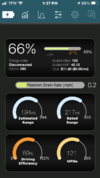GtiMart,
Thank you for your quick response. I appreciate the correction of 240v from 220. Electricity is very confusing for me to understand and really I don’t feel safe changing the batteries in my TV remote

.
I have always hated math story problems so your very thoughtful and relatively easy answer brought back some high school PTSD

Anyway, if i am getting approx 33 mph of charge and we’re to charge it from 0% to 100% it would be about 8 bucks, give or take.
thanks for dumbing this down - it really does help

If the goal was to figure out how much a "full tank" costs you, a LR tesla model 3 has (very very roughly) a 75kWh battery pack. Since your electricity costs is a nice round number of 10c a kWh, 75kWh times 10c = 7.50, or $7.50, roughly. Brand new model LR Model 3s have slightly more than 75kWh (probably like 80-82) so yeah $8 to go from 0-100%
The cars display "miles" but thats for our convenience. It doesnt charge in miles, it just does a conversion to tell us a number on the screen for a given charging rate. So, it will cost you between 7.50 and 8 to go from 0-100, but you will usually not be doing that, nor will you actually be getting "33 miles" from "33 miles added" to the vehicle, which adds complexity to this for sure.
STATS? You must pay more in Cali? At .06 that comes out to $21 a charge. Does that seem right? Again, I am only good at math if I’m typing the right numbers in my calculator
California electric costs will be from 15-16 kWh cents for "super off peak in the middle of the night 12midnight to 6am) to more than 50 cents a kWh from 4-9pm under some plans... so yes, our cheapest electricity is significantly more than you pay, and most people out here are probably paying an average of 30-40c a kWh when its all added up.
That same full tank for an average californian is likely 15 (cents a kWh) X 75 = $11.25, to somewhere around $37.50 (50c a kWh X 75), depending on when they charge, if they are on a time of use plan, etc. This still works out cheaper than gas, because our gas is likely much more than yours, too. Premium unleaded is like $4.55 a gallon right now around me, while regular unleaded is 4.25 a gallon right now.
Gas buddy says that regular unleaded is 3.19 a gallon in washington state right now. That means for a 15 gallon tank of regular gas, where you are is $51.04 on average, and where I am, for the same thing, is 63.75, or, enough to fill up your model 3 daily with just the difference.
Conversely, its bright and sunny out here most of the time, which is why so many people are getting solar.




